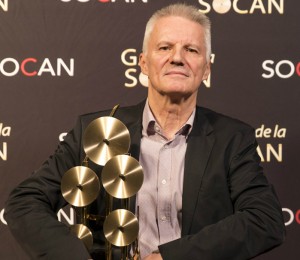
Editorial Avenue – Daniel Lafrance, winner of the Publisher of the Year Award at the Montréal SOCAN Gala 2017.
Daniel Lafrance’s is a forward thinker who seldom looks back. When ask to recount his career path, he’s a man of few words. What stimulates Lafrance clearly lies ahead. Making Éditorial Avenue ever more active, relevant and versatile has been his modus operandi since he founded the company in 2000.
Daniel Lafrance’s ties to the world of music go back to 1969, when he was a musician in a jazz combo, and many other things. Early on, Lafrance played such roles as album producer, venue booker, artist manager and music publisher, while also taking on distribution and promotion duties. “That’s how I learned the ropes,” he says. In 1976, while he’s a member of Solstice, Lafrance also produced Conventum, L’Orchestre Sympathique and Pierre Moreau. Although he played less and less, he kept himself busy being a Jack-of-all-trades for various artists, including Francine Raymond and UZEB.
But when UZEB split up in 1992, Lafrance opted to focus entirely to publishing. “I decided to go all-in and do what I like most,” he says. “When I look back now, I think I really had a visionary moment.” Lafrance left for France alongside Daniel DeShaime to develop a rights management software called Ze Publisher! which was bought by more than 50 European music publishers.
“Being a music publisher is being a developer, first and foremost”

When Rosaire Archambault and Michel Bélanger contacted him in the year 2000 to offer him the opportnity to run a new publishing company, Lafrance accepted the challenge posed by Éditorial Avenue, and moved back to Québec. From that point on, his man-wearing-many-hats career path served him more than well. “When you accompany an artist from the get-go, when they generally are without a manager, it’s quite useful to have a perspective on record contracts,” he says. “You’re in a better position to advise them and negotiate on their behalf, when necessary. In short, it gives you a wider scope on artist development. And being a music publisher is being a developer, first and foremost.”
Looking to head Éditorial Avenue, Lafrance came back to Québec with a desire to re-invent the music publishing model. He set up preference pacts, a way of doing things inspired by his stay in France. These contracts bind an artist and the rights to their songs over a period of time in exchange not only for advances, but also for musical instruments and other work tools.
“Obviously, you need to be financially solid to offer such contracts.,” says Lafrance. “But the objective is to support the artist and bring them what they need to reach their full potential. We take risks here. And that when it becomes interesting. It’s to our advantage to sign young artists looking for that kind of support. That’s where a publisher can make a real difference, at that stage. Later on, they get more experienced and many artists, nowadays, leave publishing houses to become publishers themselves. It’s a global trend. However, those artists often come back for rights management services, an expertise they don’t have.”
For Lafrance, success is a multi-faceted thing. Publishers can be satisfied with critical success or with a one-radio-hit artist, whereas a record company might find that situation dire because a radio hit doesn’t necessarily translate into music sales. “To be a publisher, you need to be in for the long run,” he says. “We don’t operate in the here and now, like record labels. We’re visionaries.” A publisher’s support also applies to supporting their artists’ career paths, such as was the case for Jason Bajada, Aliocha and Matt Holubowski, all of whom recently took part in a songwriting workshop in L.A.
For all of his vision, Lafrance is not a fan of tight yearly plans. Éditorial Avenue doesn’t have catalogue acquisition, artist signing or European sub-catalogue targets. “We don’t really control the number of catalogue signings,” he says. “It’s quite like real estate. Some years are good and we get nice offers. I’m thinking, for example, of the acquisition of such catalogues as those of Claude Léveillée, Jean-Pierre Ferland, Marcel Lefebvre’s – the ’70s Luc Plamondon – Laurence Jalbert, or Jean Lapointe… But I never set a number of signing per year.”
What he does have a say on is the diversification of his activities. This year, Éditorial developed two new sectors: a neighbouring rights department and international rights clearance. The latter’s latest negotiation was for Nintendo Japan to clear the rights for songs by Katy Perry and Taylor Swift for two video games.
It’s these new playgrounds that re-kindle the flame in Lafrance’s eyes. “I want to be here at Éditorial in five years. In 10 years,” he says. “As a matter of fact, I hope to work until I’m 90, if my health will let me. Because all this isn’t actually work, for me.”